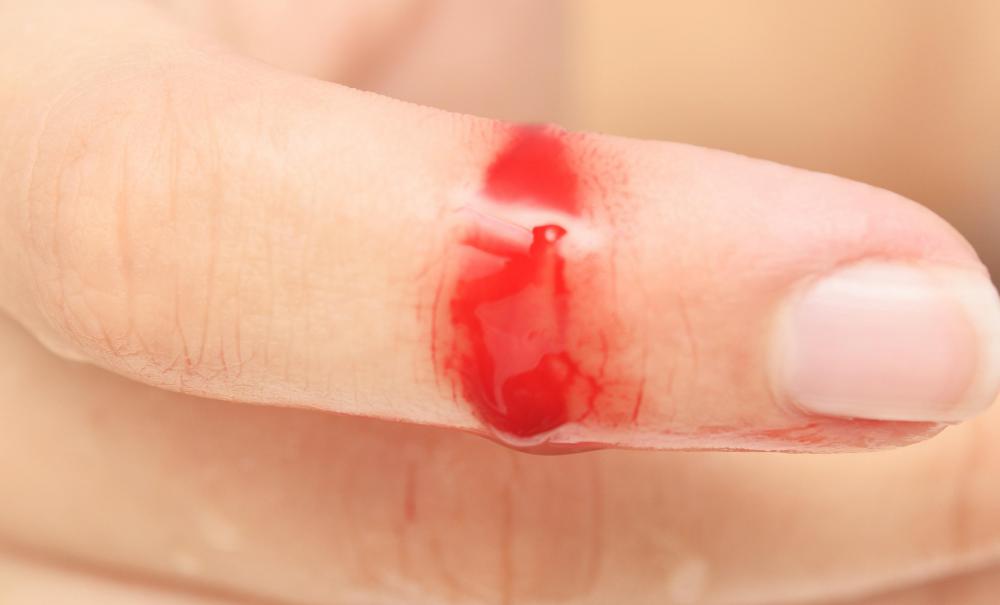At WiseGEEK, we're committed to delivering accurate, trustworthy information. Our expert-authored content is rigorously fact-checked and sourced from credible authorities. Discover how we uphold the highest standards in providing you with reliable knowledge.
What is Triage?
Triage is used in medical emergencies, as a system to sort the injured so that the greatest number of patients can be helped. In medical emergency situations where there are more injured people than there are medical resources to care for them, triage allows doctors or other health care professionals to decide which people can be helped the most, and how to help them efficiently.
Primarily used for battlefield medicine or during disaster situations, triage allows health care professionals to determine which patients require immediate attention to survive, which patients are able to wait, and which patients are beyond help with the limited resources available. Emergency Rooms also triage patients.

The medical personnel on the scene preforming triage move as quickly as possible from patient to patient assessing their situation. Patients with non-life threatening injuries are marked as low priority. Things like broken bones or minor wounds can would fall into this category. Often times, lightly injured patients, sometimes referred to as the "walking wounded", can assist each other with basic first aid and in moving to safety in a dangerous environment such as an accident scene.

Patients who will not survive without immediate medical attention, and are very likely to survive with help are given a high priority. Severe bleeding from wounds, amputation, or internal injury would fall into this category. Basic first aid is not enough to save these patients, but basic surgery will give them a high probability of survival.
Ethically and emotionally, the most difficult aspect of triage is designating some patients as requiring too much attention, or being unlikely to survive even with extreme medical care. The triage professional must make this difficult choice though, because the same four surgeons who would need 10 hours to try and save a victim of severe burns, only to give him a slight chance of survival, may be able to save dozens of less severely wounded patients, and give each of them a very good chance at recovery.

An additional aspect of triage is lowering the pressure on emergency medical units and nearby trauma units by sending lightly wounded and severely wounded but stable patients to other doctors who are more able to handle the load. Instructing lightly wounded patients to see their regular doctor, or sending severely wounded but stable patients to hospitals further away are good examples.
As a method of putting limited medical resources to the most possible good, triage is a necessary tool for health care professionals faced with an emergency situation.
AS FEATURED ON:
AS FEATURED ON:
















Discussion Comments
I agree with post three. The doctors aren't killing people; they are simply saving as many as possible.
Think of it this way: Ten people are on a skiing trip and they all get caught in an avalanche and are separated. When Search and Rescue finds them all, say within a 1/4 mile of each other, two had food in their packs and space blankets with only minor cuts from debris (they can help each other), four have broken bones but had food and coats (need medical attention but not too seriously), five had food but little warmth and now have frostbite and beginning stages of hypothermia (need medical attention now, but will survive a trip to a hospital/trauma center), and one hotshot in all spandex with a backpack as light as possible, is barely breathing due to lack of food, warmth and severe hypothermia.
Morally, it is obvious to first attend to the less severely injured and get them to a hospital now, since the injured two have already taken care of themselves and are fine. Those with broken bones will survive a wait in a shelter until more emergency vehicles and personnel can arrive and take them to alternate hospitals. This leaves us with the last victim in the worst condition. He most likely will die of hypothermia before he can be helped and he is fading fast, so consequently, he is the last to be helped because he has the worst chance of survival, past medical availability.
So now with our triage, we have saved nine out of 10 possible where if we had helped the most injured, we may have only saved five, because the less severely injured people would not have received the attention that they needed in time, while the paramedics were struggling to keep the hotshot alive, and could easily move into a worse and eventually fatal condition.
The doctors are not killing the people. They are dying of medical causes. It is morally permissible to fail to save one person in order to save many. Not all medical emergencies can be cured.
Of course. Do you believe it is morally permissible to kill many innocent people to save the life of one person?
do you believe it is morally permissible to kill one innocent person to save the lives of many innocent people?
Post your comments